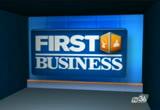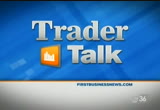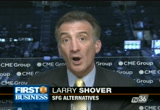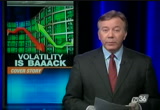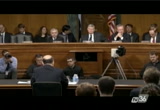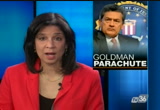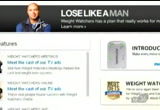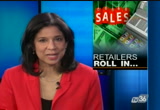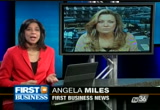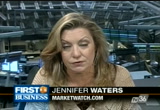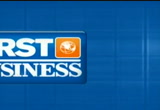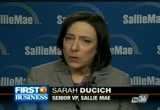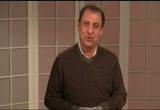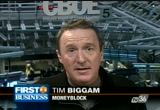tv First Business KICU February 27, 2013 4:00am-4:30am PST
4:00 am
a public service from the obesity action coalition. should you insure your vacation? tips on how to protect your time away. in today's cover story, volatility creeps back into the markets. the effect the sequester threat has on investor emotions. plus, if the thought of paying for college keeps you up at night, advice on how to start saving now. and why one trader is finally starting to bite on apple's fallen stock. first business starts now. you're watching first business: financial news, analysis, and today's investment ideas. good morning. it's february 27th. i'm angela miles. in today's first look: the market roars back. despite wavering reports about italy's
4:01 am
election, a strong sign the fed will continue quantative easing pushed the dow to a triple-digit gain. the nasdaq and s&p 500 also moved higher. gold continues to gather upside momentum, while oil is still falling. priceline and first solar could be major movers today. in earnings after the close, priceline shares shot up 27 dollars on positive profits while first solar fell 5% on its forecast. and the blackberry z10 smartphone is turning into a good call. blackberry is signaling new customers are signing on to buy the new phone. larry shover of sfg alternatives is with us on this morning to take a look at the markets. good to have you on the show, and what matters most to the market here, larry - what is happening with italy or comments from fed chair ben bernanke? > > right now i think it is more about bernanke. we saw that yesterday with that bounce- back rally. it seems like the market seems to be looking around italy knowing it's going to be a long process, it's going
4:02 am
to be choppy for the next several weeks, but it was definitely all about bernanke. > j.p. morgan's jaime dimon says that the banks will have too much capital in about two- and-a-half years. is it time for investors to bulk up on those banks? > > i do. i think so. they have gotten beaten up, and j.p. morgan is one of my favorites. i think people are starting to sell it because mortgage activity has gone flat. capital market activity hasn't been as good as expected, but long- term, it is a very, very good fundamental buy. > we are getting to the end of the month. what are you looking for from the jobs number? > > i am thinking the jobs number is going to be right at consensus, and that is going to be good, because that means we are making baby steps toward the recovery, although the unemployment rate will remain unchanged. > thank you larry. > > thank you. it's baaack. the volatility dragon has awakened from its slumber just a week ago. what woke it and how long will it breathe fire is
4:03 am
the subject of our cover story. the dow plunged 154 points monday during the last hour of trading, while the volatility index at the chicago board options exchange shot to 19 for the first time this year. what caused the spike in the so- called "fear index?" some say late-afternoon news that the sequester was far from being averted. "if you look at it from a politician's view, they tend to have a tin ear for the markets and no idea that what they are saying is causing harm." according to others, another factor for the spike in volatility - early results on italy's election revealing europe's 3rd largest economy would be locked in political stalemate, at least for a while. "i think the italian thing was the tipping point. the rest of it was whether there's going to be a sequester or not." analysts anticipated a rise in volatility ever since the vix was at its relatively sleepy, seven-and-a-half-year low last week. but boy, has it come back. so, should long-term investors be worried about our
4:04 am
volatile times, or is it just a lot of noise? "this is causing people to hit stop-loss orders. but for the long-term investor, it really raises questions about our politicians and how they don't know how to manage economic functions well." "if there was some indication that they'd do something lasting for 18 months or, heaven forbid, three years, the market would explode. there's a lot of money sitting in people's pockets doing nothing." volatile times could present buying opportunities for those thinking long-term. blackrock shared that advice, along with the warning that there will be bumps in the road. senators remain deadlocked on how to avoid the sequester with just a couple of days left for a deal to happen. president obama took his argument for more pointed cuts to a virginia town that depends on defense contracts for its citizens'
4:05 am
livelihoods. "what the sequester does is use a meat cleaver approach to gut critical investments like education and national security." speaker of the house john boehner accused the president of using the military as a "prop" to support tax hikes. fed chair ben benanke is back on capitol hill for a second day of testimony. yesterday the chairman of the federal reserve urged politicians to reach a deal and warned that automatic budget cuts could create a significant burden on the economy. mr. benrnake also made it clear the fed stands behind its bond-buying program, better known as qe, quantative easing. "notably keeping longer-term interest rates low is helping spark recovery in the housing
4:06 am
market and to increase sales and the production of automobiles and durable goods." the fed chair adds the current bond-buying program is likely to last into the second half of the year. now that jack lew has cleared approval by the senate finance committee, the full senate could vote as early as today. jack lew is president obama's pick to replace treasury secretary tim geithner. the vote by the senate finance committee came down to 19 for and 5 against the nominee. more witnesses will be called to the stand this week to testify in the civil trial against bp. yesterday a key witness testified that bp was focused on cost-cutting, which sacrificed safety, ahead of the deepwater horizon explosion that killed 11 people 3 years ago. it is the first phase of the trial, in which the plantiff will attempt to prove the severity of bp's negligence leading up to the massive oil spill. the plantiffs are expected to call the chairman and president of bp america to the stand next.
4:07 am
a $1-billion cost-cutting plan is underway at jpmorgan chase. the bank is eliminating 4,000 jobs this year in consumer banking, mostly through attrition. eventually, 19,000 jobs will be cut from its home loan business. the firm no longer needs as many people to handle defaults, which are dwindling. meanwhile, 15,000 people will be hired in asset management and commercial banking units. meanwhile, best buy is also axing jobs. the electronics retailer will cut over 400 jobs as the company tries to transform itself. under the renew blue program, best buy hopes to save over $725 million in cost reduction measures. the company reports earnings later this week. former goldman sachs director rajat gupta is sentenced to time behind bars. convicted last may of leaking boardroom secrets to a hedge fund, gupta was ordered to reimburse goldman sachs $6.2 million and spend two years in prison. goldman sachs had asked to be reimbursed for $6.9 million, the amount it spent on outside counsel for gupta's defense.
4:08 am
entrepreneurs are welcoming ipos. a new study by kpmg finds 66% of entrepreneurs expect higher ipo activity in 2013. investors note there are possible roadblocks such as market volatility and fallout from popular ipos last year. however, the majority think the improving economy will pave the way for sectors like technology, healthcare, life sciences and energy to dive into the market. weight watchers needs to watch its pay according to many of the company's employees. the new york times is reporting that despite annual profits exceeding $250 million, many employees make less than minimum wage. further fueling the anger is speculation that the reason for the low pay is because the weight watchers workforce is predominantly female. the company responded to our request for a comment, saying: "we have begun gathering feedback in a thorough, proactive process and are committed to making changes to
4:09 am
our compensation system." it's becoming tougher for some americans to buy a new car. according to findings by interest.com, new cars in most metropolitan areas are too expensive for most middle class americans. the group recommends the 20/4/10 rule: a down- payment of at least 20%, financing for 4 years and interest and insurance that does not exceed 10% of household earnings. "we think that probably for most median-income families, a $300- or $400-a-month payment over 4 years is probably a much more realistic and affordable goal." the most affordable places to buy a new car include tampa, miami and detroit. earnings news from retailers is rolling in. 2012 ended on an up note for macy's, which topped expectations. shoppers are buying the merchandise and investors are back to buying the stock, which rose a dollar yesterday. home depot also beat expecations, led by sales of cleaning supplies connected to
4:10 am
superstorm sandy. hd shares rallied 3 dollars. profits were up at autozone, but the auto parts company ran into sales trouble at the end of the year and is losing steam as customers await tax refunds. shares yesterday hit a clunker, falling a couple dollars. in an attempt to improve safety, harley davidson will no longer play music on its factory floor. music is a staple in many factories and jobs that involve a lot of reptition. but not after this week at the motorcycle maker. as a company spokesperson put it, "it's important for people to become focused on what they do." the music industry is finally recording a revenue uptick - the first since 1999. it was one of the first businesses to feel the full effect of the digital blues and the ensuing plumet in profits. global sales rose a scant 0.3% last year, but that's enough to give hope that the industry may finally be able to sing a new, profitable, tune. still to come, juggling college
4:11 am
costs remains a worry for most americans. how to start saving early. that's later on. but first, if you've ever wondered if trip insurance was worth the cost, stay tuned. why it may be able to help get you out of a jam while abroad. that's next. this neighborhood sure has changed a lot over the years.
4:13 am
you know there was a time when people like me couldn't live here. i'll never forget being told i wasn't welcome in this neighborhood. well i own this building now, the fair housing act made a difference for someone like me. so i can choose where i want to live, free from discrimination. glad you could make it, right this way...
4:14 am
businesses are sending more employees on the road again. the global business travel association says more companies are attempting to grow internationally. with airfare and hotel rates on the rise, many buyers will have to balance the spiking costs with a limited increase in budgets. businesses will spend an average of $492 for employees' domestic airfare, and around $1300 for international trips. travelers are always presented with a question of whether to buy travel insurance. jen waters of the column consumer confidential found at marketwatch.com joins us, and jen, i have to say, i always feel like it is a rip-off. is it worth it? > > in some cases it could be a rip-off. but i will tell you, here is the thing - and business travelers really need to think about this more than
4:15 am
anyone else, particularly if they are traveling out of the country - and it's that you really should have some kind of, another level of insurance to cover you, particularly in medical emergencies. they have something called medevac, which is medical emergency evacuation plan, and if you are stuck somewhere in a foreign country and you get sick or you hurt yourself or you just kind of don't feel well, it is not a full-blown sickness, then you should have that, because they will take you and they will hold your hand through the whole process. > that sounds worth it jen. > > that is worth it if you are doing that, but i will tell you, and here is the other thing that should be worth it, and i think we found this out with the carnival triumph people, is that, if there is some kind of disruption in your service, if there is a cancellation, if there is an issue, if you have trip insurance for those kinds
4:16 am
of issues, you will be covered for all that. of course, those carnival people are covered, because carnival has done a very good job of that. but if there is a delay getting into the port and you miss a flight for example, and you have trip insurance on that, you will get coverage for that. the most important times to do it are when you are taking an extended trip and when you are taking a cruise. in fact, the u.s. embassy says if you are taking cruises, always get the travel insurance. > interesting. what are the costs? > > the costs would be dependent on the length, the duration of your trip, the cost of your trip, where you are going. but more importantly, it depends on your age, and how risky the trip is for your age. so if you are 20 years old and you're going through london and you're couch-surfing, your travel insurance is going to be a lot less than if you are 65 and you are going to guatemala to hike. and the older you get, the more expensive it is. > i still feel people might buy this and then something is not covered. so what does it include? > > you could get a really jacked-up medical insurance plan that is going to cost you 200, 300 bucks; or you could get
4:17 am
a basic plan that will only cost you, say, $25 or $30. so, you need to look at the policies, you need to see what you have on your own insurance policy - remember, if you are on medicare, you do not have coverage outside of the country - and you just need to look at that and compare and shop around. do not, do not buy travel insurance from a travel agent, because they get commissions on that, and they are not really selling you the best policy for you. > good to know. you can find more on marketwatch.com. that is jennifer waters of consumer confidential. thanks jen. > > thank you. still ahead, how to budget for the rising cost of college. that's next.
4:20 am
and there's a big advantage parents can give their kids -- making sure they get active at least 60 minutes each day. studies show that physical activity not only helps kids stay healthy, it can enhance important skills, like concentration and problem solving, which can improve academic performance. this means physical activity can help your kids in the most important game of all -- life. th a deadly disease. i was one of them. i'm a nurse and i knew how damaging the disease was to my life. nothing i tried seemed to work. my brother died. from complications of the exact same preventable disease and i knew i had to do something to get healthy.
4:21 am
my disease was obesity and after consulting with my doctor, i received the effective treatment i needed. obesity is a second leading cause of preventable death in the united states. but it's a treatable disease, and there's effective treatment options available. now is time to get help. please join the obesity action coalition and acknowledge obesity as a disease for acceptance, for access to all effective treatments, including diet and exercise, pharmacotherapy and weight-loss surgery for obese adults with at least one obesity related comorbid condition. visit obesity action dot org and sign an open letter pledging your support and for more information about how to talk to your doctor about your weight and your treatment options. together we can make a choice to end obesity now. a public service from the obesity action coalition.
4:22 am
a new study shows surprising statistics about the way americans are saving money for college. who would know better than somebody with sallie mae? sarah ducich joins us on the show this morning. good morning to you. let's get the bad news out of the way first. what are americans doing wrong? > > not enough families are actually creating a plan to pay for college. only about 1/3 of families have a plan. their goals are high, but they don't have plans on how to meet those goals. so they know it's important, they know investing in college is important. that's good. we just need to see more and more families just starting
4:23 am
to take the first steps, starting to put aside a little bit of the money, planning ahead, create a plan for how to pay for college. > where should they be investing or parking their money? > > one of the tools that we have at salliemae.com/invest is an education investment planner that allows families to see the tools and options that are available to them to create a plan, and where they should be saving and what will get the most bang for their buck, essentially, so that when their child is ready to go to school, they can actually pay for all of the years, or at least fund a portion of their education for them to get that degree. that is so important. > with the dip in the economy, is your business still strong? > > families are paying their loans, students are paying their loans. most of our loans are current, and our numbers are improving. > there is a push right now out there, people are saying college just isn't worth it. is it worth the investment? > > it absolutely is worth the investment, but it has to be
4:24 am
done carefully and with a great deal of research. you invest in a stock, you just don't go out and buy it because you feel like it. you research that stock. same thing with colleges. research, create a plan, and what we see is, among a lot of the recent economic research is, individuals with bachelor's degrees have weathered the recession so much better than their less-educated peers. > great to have you on the show. thank you very much. > > thank you for having me. coming up, ideas on what to sell and what to buy in the stock market.
4:27 am
4:28 am
> > looking at a stock that used to be on everyone's buy list, which is apple, the stock not too long ago was over $700, now trading in the mid-$400 range. looking at the yearly low around $435, somewhere around here i like it on a value basis. i think the growth days may be gone, especially given hewlett- packard now undercutting their margins may squeeze a little, but, at a 10 pe with $42 a share cash and over 2.5% yield with maybe a dividend increase being forced on them, i kind of like it around here as a value play. > oh, now you like apple. > > now i like apple. price does matter. > it took a long time for that stock to come down to your levels. what about the blue chips here? what are you buying or what would you buy? > > the same kind of idea there. i think it will be tough sledding for the next several quarters here in the equity market. so, looking to grab
4:29 am
some yield here. those stocks have finally come back down in little, names like procter and gamble, dupont, 3 m, utex, low- beta kind of higher-yielding stocks with a little bit of growth, avoiding the utilities that really don't have much growth going forward. so, if they can throw off 2.5 to 3% yield and grow at about a 5 to 10% rate, i think that is the place to be going forward, at least for the next several quarters. > and what is on your sell list? > > sell list, i think kind of the high-flyer names that have been the big out-performers: look at a stock like amazon, google, any of the names that have really run up big. i think those will be the ones that, if we do fall further, will be the first to crumble. and this p/e expansion on those stocks i think may be unwarranted, especially if we get into a little more inflationary environment. > tim, thank you very much. > > you bet. thanks angie. that's all the time we have for today. coming up tomorrow in movies & money, oscar fallout at the box office. from all of us at first business, thank you for watching, and have a great day!
92 Views
IN COLLECTIONS
KICU Television Archive
Television Archive  Television Archive News Search Service
Television Archive News Search Service 
Uploaded by TV Archive on

 Live Music Archive
Live Music Archive Librivox Free Audio
Librivox Free Audio Metropolitan Museum
Metropolitan Museum Cleveland Museum of Art
Cleveland Museum of Art Internet Arcade
Internet Arcade Console Living Room
Console Living Room Books to Borrow
Books to Borrow Open Library
Open Library TV News
TV News Understanding 9/11
Understanding 9/11
